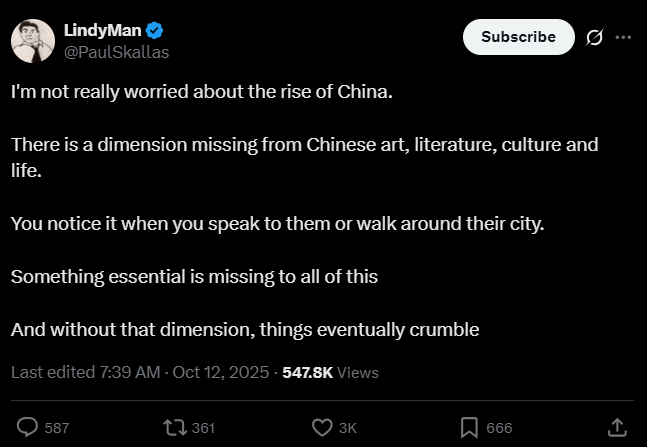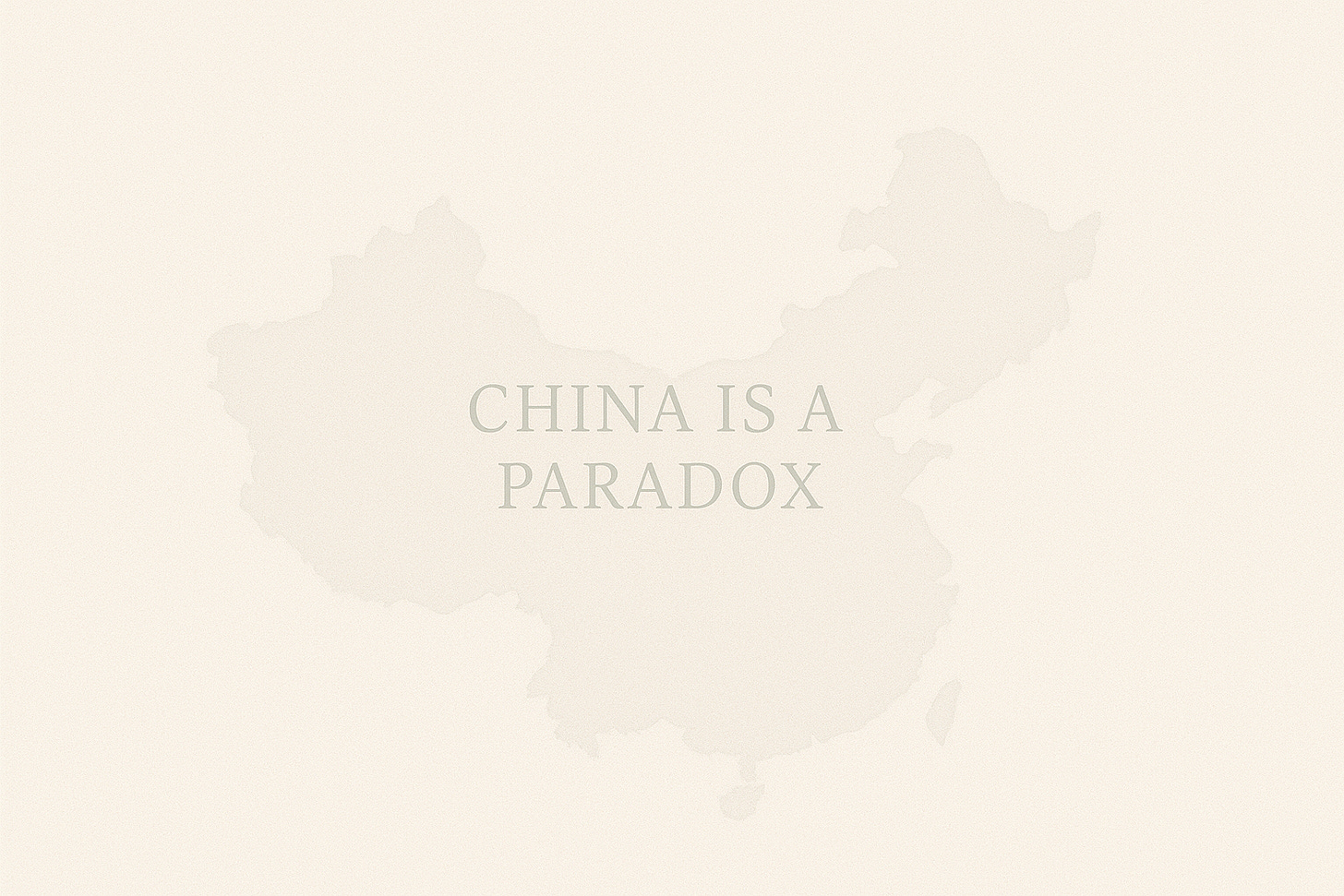China is a Paradox
And Worthy of Study
China is a paradox.
China is both modern and poor. Its high speed rail departs from gleaming eastern cityscapes, stretching westward over 50,000 km, carving through mountains, jumping valleys, and careening above tired country-side dwellings which house the hundreds of millions of Chinese still earning <US$7 per day.
China’s rise has been unprecedented and yet its society remains pessimistic. Despite the growth miracle over the last 45 years, the tribulations of the 20th century have engrained themselves into the cultural DNA. Even amidst growing middle class in affluent eastern cities, most remain insecure and anxious in their outlook.
China’s leadership subscribes to Marxist-Leninist doctrine, yet its state-guided capitalism, proud nationalism, and online discourse often resemble more fascist modes of organization.
China “can only compete through IP theft and subsidies”, yet its high tech sectors march from strength to strength: compounding off one another atop its “deep infrastructure” which boasts ~70m industrial workers, increasingly dominant in high-tech value chains from renewables to EVs, robotics to drones, biotech to precision machining, and impressive gains in AI and semis.
At the same time, the broader economy is struggling. While high tech and manufacturing continues to hum, China is still recovering from its massive property bust, its local government debt is extremely high, youth unemployment statistics are no longer published, and growing geopolitical headwinds challenge its key export markets. China is digesting the excesses of prior decades, and the deteriorating ROI on infra spend will require economic reform or an acceptance of lower growth or both.
Western experts claim China is both “too inefficient” because of state involvement, yet also “too competitive” requiring trade barriers to protect local industries from the Chinese juggernauts that have survived the gladiatorial arena of provincial competition.
China’s internet sits behind “The Great Firewall,” bifurcated into its own parallel ecosystem with greater political censorship, and yet China is dominating open source AI with eight elite labs dropping open source SOTA-level models monthly, now on course to become the global standard.
Time and time again, western experts have predicted that, due to its contradictory political and economic model, China would 1) either implode or 2) require political reform. And yet, year after year, decade after decade, the pundits are proven wrong. Neither implosion, nor substantial political reform seem likely as Socialism with Chinese Characteristics marches on, paving its own path.
China has been one of the largest beneficiaries of globalization, now a top three trading partner to ~77% of the globe yet is now racing as fast as possible for self-sufficiency in almost every domain of significance: from food to energy to high technology.
China is both ancient and tech-forward. It is a 5000 year old civilization with a 76 year old communist government which tried and failed to stamp out many traditional beliefs and institutions before embracing markets and vaulting hundreds of millions from rural poverty to urban prosperity in less than two generations, creating perhaps the most digitally fluent populace on the planet in the process. This upheaval has produced an unlikely blend of rampant materialism, Darwinian competition, strong familial ties, proud nationalism, tech optimism, and economic pessimism - all under a sometimes overhanded, yet highly technocratic elite seeking to guide this chaotic and unprecedented rise.
China is the only country for which I have heard - fairly credible - arguments in favor of a 30% devaluation of the currency and a 30% revaluation of the currency in the same five minutes. De-valuationists claim China is in a balance sheet recession and will need to print substantially to stimulate domestic consumption. Re-valuationists claim the cost of living in China is wildly low relative to its modernization-levels and wages are repressed to boost exports fueling problems from trade imbalances to sluggish domestic consumption. Oddly, both appear true at the same time.
Paradoxically, China’s largest challenge today - demographics - stems (primarily) from its stunning success in prior decades - an unmatched pace of industrialization, urbanization, and education - which all drive declining birth rates.
I could continue, but I imagine you have gotten the point.
China is a paradox.
I am not a China expert and probably never will be. Many have dedicated their lives to understanding these tensions and have barely begun to scratch the surface.
The one thing which is abundantly obvious though is that China is worthy of study: 1) because these paradoxes are genuinely fascinating and 2) because the model is working; China’s achievements, despite using a different system, are undeniable.
I’m surprised it has taken so long for folks to ask: why?
Takes like this from @PaulSkallas are part of the problem.
They seem similar to early cope-fueled European critiques of America; and we know how that has played out.
Perhaps no one knows the Lakers team better than Celtics fans. No one can quote Yankees stats like a Red Sox fan. Rivalries house animosity but also respect: a realization that an opponent is worthy of study and even strategic imitation at times to remain competitive.
I’ve been surprised it has taken this long for the U.S. to wake up to the fact that China is a true competitor. As China leaps forward in industry after industry, the tropes around IP theft and state subsidies will ring ever more hollow. Cope in its purest and least helpful form.
This is starting to change. U.S. elites - particularly in tech circles - are beginning to take Chinese competition seriously, as they should.
Peter Thiel has an interesting idea in Zero to One about the founder paradox. The basic idea is that successful founders are special because they contain often diametrically-opposed attributes within a single person. They are both visionaries and intensely practical. They are delusional egoists and humble enough to learn and course correct. They are optimistic about the outcome and yet intensely paranoid about the journey.
To quote Nietzsche, “The great man is a contradiction made flesh.”
These inherent tensions are what make for the extraordinary outcomes which are worthy of study.
A similar lens can be applied to countries, and perhaps no country is a larger paradox than China. This is exactly why, regardless of your political views, it is worthy of study.
“The best hedge I know against heightening tensions between the two superpowers is mutual curiousity” - Dan Wang
Life update: I have moved to China and plan to write more about the evolving tech ecosystems between the two superpowers.
I also have been writing long form AI and Robotics research at Delphi Intelligence, all free. If interested, can check out some of my prior pieces below:
Humanoids - Sizing the Profit Pools



